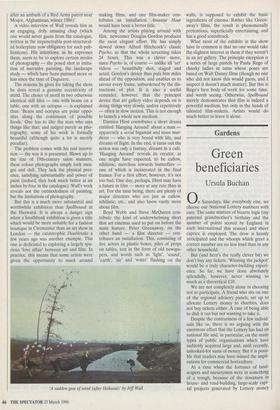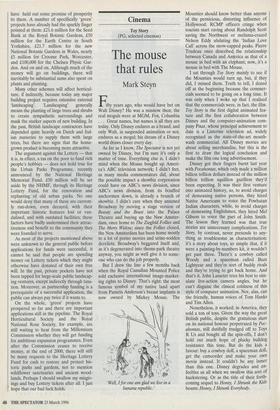Gardens
Green beneficiaries
Ursula Buchan
On Saturdays, like everybody else, we choose our National Lottery numbers with care. The same mixture of bizarre logic (my paternal grandmother's birthday and the number of points scored by England in each international this season) and sheer caprice is employed. The draw is keenly anticipated and the whoops which greet a correct number are no less loud than in any other household.
But (and here's the really clever bit) we don't buy any tickets. 'Winning the jackpot' would be a truly character-building experi- ence. So far, we have done absolutely splendidly, however, never winning so much as a theoretical £10.
We are not completely alone in choosing not to participate. A friend who sits on one of the regional advisory panels, set up to allocate Lottery money to charities, does not buy tickets either. A case of being able to dish it out but not wanting to take it.
Despite the contrariness of a few individ- uals like us, there is no arguing with the enormous effect that the Lottery has had on national life and, in particular, on the many types of public organisations which have suddenly acquired large and, until recently, unlooked-for sums of money. But it is possi- ble that readers may have missed the impli- cations for commercial horticulture.
At a time when the fortunes of land- scapers and nurserymen were in something of a trough, because of the downturn in house- and road-building, large-scale capi- tal projects generated by Lottery money have held out some promise of prosperity to them. A number of specifically 'green' projects have already had the sparkly finger pointed at them: £21.6 million for the Seed Bank at the Royal Botanic Gardens, £50 million for the Earth Centre in South Yorkshire, £21.7 million for the new National Botanic Gardens in Wales, nearly £5 million for Croome Park, Worcester, and £100,000 for the Chelsea Physic Gar- den. And on and on. Although much of the money will go on buildings, there will inevitably be substantial sums also spent on plants and planting.
Many other schemes will affect horticul- ture, if indirectly, because today any major building project requires extensive external `landscaping'. 'Landscaping' generally means the planting of large trees and shrubs to create sympathetic surroundings and mask the starker aspects of new building. In the past, British landscape contractors have depended quite heavily on Dutch and Ital- ian nurseries to supply them with large trees, but there are signs that the home- grown product is becoming more attractive.
The argument against the Lottery — that it is, in effect, a tax on the poor to fund rich people's hobbies — does not hold true for the Urban Parks Programme, recently announced by the National Heritage Memorial Fund. £50 million will be set aside by the NHMF, through its Heritage Lottery Fund, for the renovation and replanting of old urban parks. No one would deny that many of these are current- ly run-down, even decayed, with their important historic features lost or van- dalised, and with outdated facilities; these factors have badly undermined their attrac- tiveness and benefit to the community they were founded to serve.
As most of the projects mentioned above were unknown to the general public before applications for funds were successful, it cannot be said that people are spending money on Lottery tickets which they might otherwise have donated of their own free will. In the past, private pockets have not been tapped for large-scale public landscap- ing ventures, except indirectly through taxa- tion. Moreover, as partnership funding is a prerequisite of a successful application, the public can always pay twice if it wants to.
On the whole, 'green' projects have prospered so far and there are important applications still in the pipeline. The Royal Horticultural Society and the Royal National Rose Society, for example, are still waiting to hear from the Millennium Commission whether they will get funding for ambitious expansion programmes. Even after the Commission ceases to receive money, at the end of 2000, there will still be many requests to the Heritage Lottery Fund for cash to restore and protect his- toric parks and gardens, not to mention wildflower sanctuaries and ancient wood- lands. Perhaps I should swallow my misgiv- ings and buy Lottery tickets after all. I just hope that our bad luck holds.



































































 Previous page
Previous page